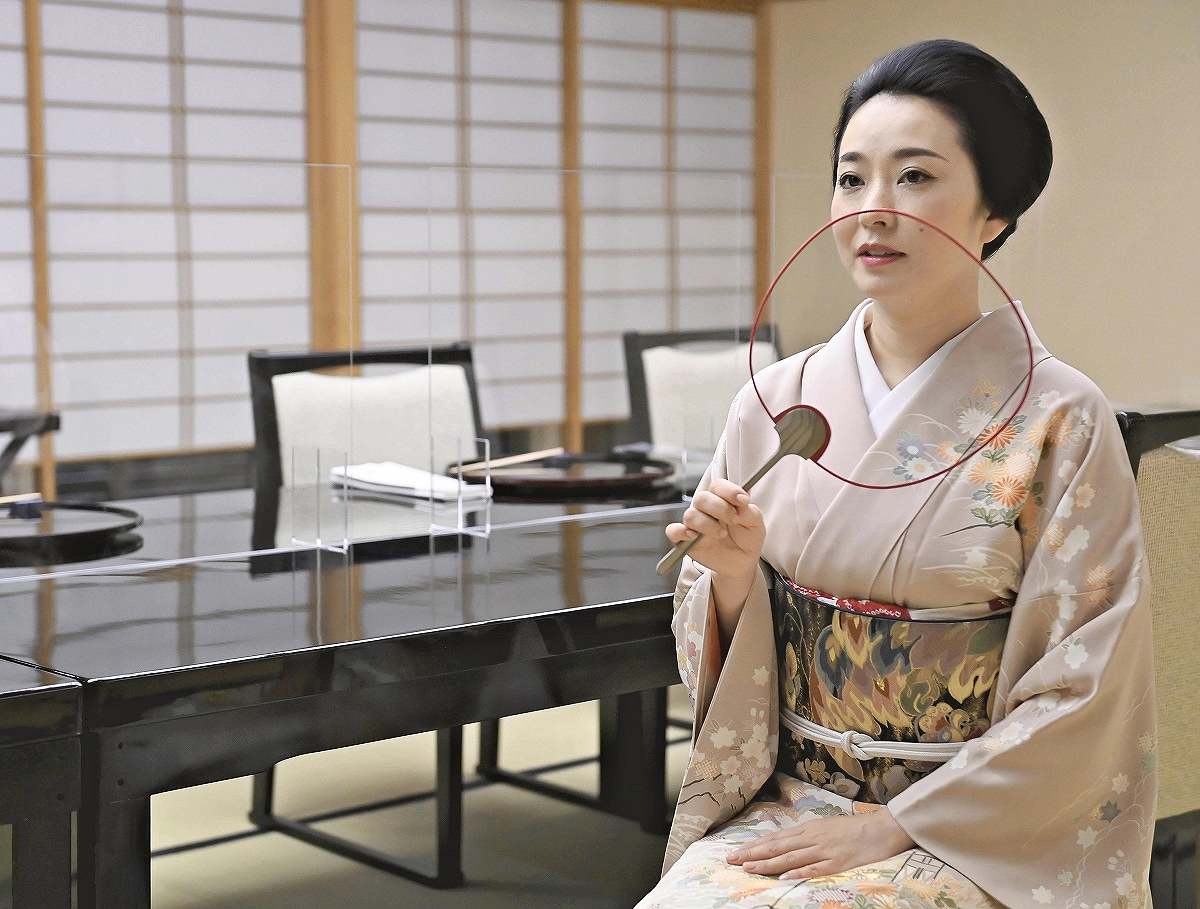
Geisha Koiku speaks through a clear acrylic handheld fan at Akasaka Asada, Minato Ward, Tokyo.
9:38 JST, December 21, 2020
Traditional Japanese ryotei restaurants are facing tough times.
Amid the spread of the novel coronavirus that has compelled the general public to stay at home, ryotei, which have long been a luxurious and business-style setting for dining, are eager to attract new customers through unconventional services such as allowing customers to view geisha dance performances via video and delivering the taste of ryotei to their homes — all for the sake of keeping this part of the culture alive.
“In a typical year, our tables are all booked almost every night during the year-end party season,” said 52-year-old Shota Asada, president of Akasaka Asada, one of the ryotei restaurants in Tokyo’s Akasaka district.
“But this year, we’ve received a frightening number of cancellations.”
Asada opened in Akasaka in 1971 with its roots in a long-established ryokan inn in Kanazawa. It has for decades entertained political figures and those in business circles with its strong reputation for Kaga cuisine, featuring fresh ingredients brought in daily from Kanazawa, as well as its geisha who sing and dance.
The number of customers has drastically declined because of the “new lifestyle” amid the coronavirus crisis, during which mealtime conversations and the pouring of drink for customers at dinner table are discouraged.
The government’s Go To Eat campaign, which was set up with the intent of supporting the restaurant industry, briefly helped Asada come out of a slump, but the ryotei have experienced another spate of cancellations of year-end party reservations since late November as infections have been on the rise again.
Under these circumstances, Asada offers private rooms with a space of about 2 meters between seats and, at the customer’s request, also sets up acrylic panels.
Consideration is given to not tarnishing the elegance of ryotei, so geisha cover their mouths with sanitized or transparent handheld fans when pouring drinks and speaking to customers.
An association comprising ryotei in Akasaka, among others, took a new approach in which geisha dance performances were recorded on video and displayed in the private rooms. Normally, it costs tens of thousands of yen to invite a geisha to perform in a room. Video allows customers to enjoy the geisha performances at a reasonable cost.
“We wouldn’t have come up with this idea without this coronavirus disaster,” Asada said. “I hope this will be an opportunity for those who have never had a chance to visit ryotei to experience our culture.”
■ Perseverance
According to the Tokyo-based association for promotion of Japanese culinary culture, ryotei in Tokyo began in the mid-Edo period (1603-1868) as a place for cultural figures to gather and enjoy wining and dining. There were 523 ryotei in Tokyo at the peak in 1977, but the number had plummeted to 36, or less than 10%, in 2019.
A number of ryotei had closed even before the pandemic because of the lack of successors, diminished interest in washoku Japanese cuisine and dietary diversification.
In recent years, however, washoku and geisha performances have drawn increased attention again, thanks to a jump in the number of overseas tourists, and ryotei have looked at the Tokyo Olympics and Paralympics as a great business opportunity.
Although the pandemic is a major blow, ryotei view the situation a chance to spread their culture to those who have less exposure to it by doing things such as launching a service that allows customers sample their cuisine from the comforts of their own homes.
Shimogamo Saryo, a restaurant in Kyoto that began operating in 1856, has suffered with almost zero group visits during the spring and autumn tourist season. It then started selling a series of “ouchi ryotei” meals that allow customers to enjoy Shimogamo Saryo’s dishes without having to visit the location.
Bento meals are usually factory-made, but the restaurant’s “ouchi ryotei” bento timed for when customers were ready to take out.
“Nothing will come from us simply lamenting the fact that there are no customers here,” a person in charge at Shimogamo Saryo said.
Top Articles in Society
-

Man Infected with Measles May Have Come in Contact with Many People in Tokyo, Went to Store, Restaurant Around When Symptoms Emerged
-

Woman with Measles Visited Hospital in Tokyo Multiple Times Before Being Diagnosed with Disease
-

Australian Woman Dies After Mishap on Ski Lift in Nagano Prefecture
-

Foreign Snowboarder in Serious Condition After Hanging in Midair from Chairlift in Nagano Prefecture
-

Record-Breaking Snow Cripples Public Transport in Hokkaido; 7,000 People Stay Overnight at New Chitose Airport
JN ACCESS RANKING
-

Japan Institute to Use Domestic Commercial Optical Lattice Clock to Set Japan Standard Time
-

Israeli Ambassador to Japan Speaks about Japan’s Role in the Reconstruction of Gaza
-

Man Infected with Measles May Have Come in Contact with Many People in Tokyo, Went to Store, Restaurant Around When Symptoms Emerged
-

China Eyes Rare Earth Foothold in Malaysia to Maintain Dominance, Counter Japan, U.S.
-

Prudential Life Insurance Plans to Fully Compensate for Damages Caused by Fraudulent Actions Without Waiting for Third-Party Committee Review



















